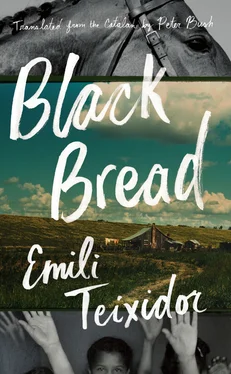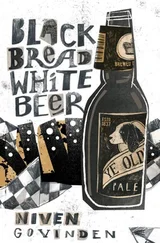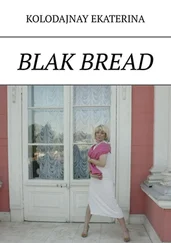“We were only just talking about that…” said Grandmother, hesitantly. “I couldn’t care less. But these two tummies have been rumbling for some time.”
“It will be ready in a jiffy,” Aunt Ció put the light down on the old sideboard. “Can you wait a minute? Andreu, you come down with me and have a bite to tide you over. They do say the longer you wait the better it tastes. Empty guts, down in the dumps.”
She said that in an amusing fashion but we weren’t in the least amused. You could tell it was forced, an expression that didn’t fit the situation or moment. I reluctantly levered myself up from the floor and stood next to Aunt Ció.
“We’ve gone to get Father Tafalla,” said Aunt Ció, slightly changing her tone, before she left, as if she would be sorry to go without passing on the latest news about what was happening downstairs. “He always gives good advice.”
“At this time of night?” Grandmother asked, rather surprised. “Won’t they think someone’s fallen ill and is on their last legs?”
“No, we can rely on him, and when he sees Quirze, he’ll understand.”
Aunt Ció looked round and said: “Come down and fetch something.”
I followed her silently to the kitchen. She only made one comment in a hushed tone, that I didn’t really understand, as if she’d said “as we will see,” or “let’s wait and see,” or some expression of the sort.
My legs were almost shaking with fear at the idea of confronting Uncle Quirze’s rabid expression and Aunt Enriqueta’s half defiant, half phlegmatic stance. However, Aunt Enriqueta was alone in the kitchen, sitting at one end of the table, arms folded, head lowered, as if she was waiting for someone. Uncle Quirze wasn’t there.
“Andreu is going to take something upstairs for Grandmother and the little girl,” said Aunt Ció, opening drawers and taking a plate from the rack, and she spoke blankly, as if duty-bound towards her sister, or as though she was apologizing for turning her back on her or making a friendly gesture. “A couple of pans of milk perhaps.”
Then I noticed that Aunt Enriqueta was crying. She was crying silently, her tears hidden behind her loose hair and bowed head. You could tell she was crying by the way her body shook and her hands rubbed her eyes.
“Andreu, love…” I heard her say and my heart leapt as if suddenly someone was about to blame me for everything that had happened.
Aunt Ció swung round, surprised. Aunt Enriqueta looked up, and her red eyes stared at my face: “Don’t take it badly…what I said wasn’t about you. We all want you to continue with your schooling and go to university, whatever it takes. It was just that I was sorry I couldn’t help you more now your father isn’t here, and that between us we can’t find you what you need. I’d have been so pleased to help you… we… your mother…”
Her sobs choked the words in her throat and Aunt Ció went to give her a cuddle, as she said: “Love, Andreu knows that… He will think it over, you’ve seen how we’ve helped them as much as we could, I mean, everybody, Núria, him, the brothers and sisters, everybody. Don’t worry, he didn’t hear a thing, you didn’t hear a thing, did you, Andreu?
I shook my head.
“They were upstairs with Grandmother,” continued Aunt Ció, returning to the kitchen range.
I didn’t know what to do or say. A wave of red-hot fire seared me from chest to face. I was stranded in the middle of all that, and felt similar to how I’d felt some time ago at home when I overheard the conversation between Aunt Felisa and Mother, her sister’s laments, doubts and the fear aroused by a giant of a man — that’s how I imagined the widower, from what they’d said — they wanted to marry her off to. I’d registered, if rather hazily, though it was much clearer now, that Aunt Felisa’s panic stemmed from her ignorance of the new role awaiting her that provoked appalling fear, a sense of inevitability and frustration at being unable to flee the trap they’d set her. I intuited that Aunt Enriqueta was facing the same situation and same trap, with a similar fear. I knew perfectly well what she’d said about my schooling wasn’t behind her tears or anxiety. Why would they have rushed to get Father Tafalla, if I and my future had been the reason for the confrontation? Images of Pere Màrtir and the naked youth with TB beneath the elm loomed at the back of my mind, I didn’t exactly know why, as if they were responsible or even saviours with respect to the misunderstandings that had arisen like the small spark that had lit a conflagration, or perhaps they came to mind to protect me and indicate an escape route with their silent example.
“Take all that and carry it up to the sitting room,” said Aunt Ció, placing a tray of biscuits, chocolate and three bowls of milk in my hands. “If you want more or need something else, give me a shout. Off you go now! Take the candle too.”
Before leaving the kitchen I tried to make eye contact with Aunt Enriqueta, as if to say goodbye, but her head sank down and her eyes stared vacantly.
I slowly climbed the stairs, frightened I might fall with the candle dangling from one of my hands that supported the tray.
Grandmother had got up and she told me to put the tray on the sewing table in the gallery. We all three sat on the bench facing the fruit orchard, and Cry-Baby started dunking biscuits in her milk, I did likewise and Grandmother still said she wasn’t hungry. We stayed silent for a time, until we heard somebody running towards the house.
It was Quirze, who ran into the house without glancing at the balustrade where Cry-Baby and I were standing, our mouths full.
“Sit down, sit down…” Grandmother urged. “Quirze will be here any minute and we can go to bed right away.”
“Won’t anyone else be coming?” asked Cry-Baby.
“Father Tafalla will take his time, that is, if he comes,” replied Grandmother. “He’s the only one who doesn’t go out at night to give the last rites to the dying. He tells the other monks to go. And as he informed us one day, he advises them not to hurry when it’s their turn, to take their time getting up if they are in bed, to give their faces a good wash to wake themselves up and dress properly against the cold if it’s winter or the heat if it’s summer… And when we asked him why he took it so calmly, what if they didn’t hurry and arrived at the sick person’s bedside when he’d already cocked his toes up, he replied that families who sent out an alarm call in the middle of the night would have had days, weeks and even months to ask a priest to bring the dying individual the last rites, Eucharist and unguents, but they always did it in a rush at untimely hours because they were slothful and apathetic and didn’t altogether believe in the healing power of the sacrament; for them the Eucharist or extreme unction were like the last port of call, the end, the final farewell, the last sacraments that meant nothing else could be done, and that’s why they waited until the very last moment and it never occurred to them that the Saint Camillus community also dealt with bodily health, doctors of bodies and souls, healers and curers, and when they came to the bed of the dying they should have clear heads so as to decide whether to call a doctor, take the sick to hospital or give them an injection, if that was in order, so they couldn’t be half-asleep, or risk exposing themselves to catching cold or to gusty winds and return to the monastery ill themselves, every monk was needed, they had lots of work and couldn’t fall sick or give up their toil in the monastery or outside, because the convent is also a hospital full of ill…”
Grandmother rambled on, rather deliriously, as if she was afraid of the silence that would start to pressurize us if she shut up and was afraid of what we might ask Quirze now he was back.
Читать дальше












